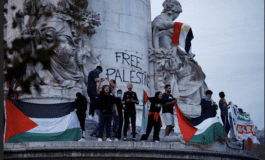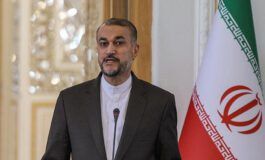
BETHLEHEM — Amid lavish settings and tight security, hundreds of investors and entrepreneurs from around the world last week gathered in the southern West Bank town of Bethlehem to discuss and plan joint business ventures.
Palestine Authority (PA) officials described the “Palestine Investment Conference” as a “mega event” in light of the large number of attendants, many of whom were business people from expatriate Palestinian communities in the Gulf region.
PA President Mahmoud Abbas opened the conference on Wednesday, May 21, at the InterContinental Hotel with a brief speech in which he appealed to investors from the Arab world to invest in Palestine and in peace.
Abbas sought to strike a delicate balance between the anti-business and investment environment emanating from the entrenched Israeli occupation and the need to maintain a semblance of economic well-being in the Occupied Territories, if only to enable Palestinians to withstand systematic Israeli repression aimed at killing Palestinian aspirations for freedom and independence.

Abbas carefully avoided any bleak assessment of “peace talks” with Israel, ostensibly in order to maintain the “positive atmospherics” of the conference. However, Abbas’s artificial optimism did little to reassure skeptics worried that investing in Palestine while still under military occupation may not be a good idea.
Former British prime minister and Quartet envoy to the Israeli-Palestinian peace process, Tony Blair, a key proponent of the economy-first agenda in Palestine, sought to foster optimism, saying Palestine deserved a prosperous economy. Some Palestinian intellectuals and journalists accused Blair of trying to use economic inducements to bribe the PA into giving political concessions to Israel, especially with regard to keystone issues of the Arab-Israeli conflict such as Jerusalem and the right of return of Palestinian refugees.
Blair, who undertook laborious efforts to convince Israel to ease up restrictions strangling the Palestinian economy, has hardly succeeded in getting Israel to remove even two or three roadblocks in the West Bank. Indeed, a recent report by the United Nations pointed out that Israel actually increased, not decreased, the number of barriers and roadblocks in the West Bank, a fact likely to generate despair among those who think that no viable economy can be sustained in an environment of roadblocks, checkpoints, military curfews and closed military zones.
According to organizers, as many as 1,500 local and foreign investors and business representatives participated in the three-day conference. Participants included a high-level delegation from the United Arab Emirates that arrived aboard a Jordanian army helicopter that flew them directly from Amman, apparently in coordination with Israel. Many other participants had to receive special access permits from the Israeli army, a grim reminder that accessibility to the West Bank, including its business market, is tightly controlled by Israel.
A number of invitees, especially Palestinian expatriates, were barred for political reasons. Some of the more skeptical participants said they only came to visit families and in order to be able to pray at Al-Aqsa Mosque in Jerusalem. Others said they wanted to enjoy the holiday setting and meet old friends.
Yet despite the omnipresent specter of the Israeli occupation, epitomized by army barriers and roadblocks near the conference venue, the gathering itself was successful. According to PA Prime Minister Salam Fayyad, the man behind the conference, around $1.4 billion was pledged for joint business projects, which could create up to 35,000 jobs in the West Bank. The sum reportedly includes about $550 million from major Arab investors for the construction of a new Palestinian town near Ramallah.
In a press conference marking the end of the conference, Fayyad announced a joint strategy between the private sector and the government “to strengthen coordination and integration” for the purpose of bolstering the national economy. “The Palestine National Authority believes in the leading role of the private sector and the importance of integration with the efforts exerted by the government,” he said, adding that he hoped that the conference would lead to “economic recovery,” “sustainable social and economic planning and management,” “developing services” and “tackling Israeli impediments to strengthening the Palestinian economy.”
Responding to critics who have argued that foreign-induced economic investment was inherently artificial and designed to bribe Palestinians to give political concessions to Israel, Fayyad said there was a total separation between peace talks with Israel and efforts to attract foreign investment into Palestine. “This is not an economic conflict that requires an economic solution. This is a political conflict that requires a political solution. And I assure you that we won’t meet any political demands attached to efforts to revive our economy,” he said.
Recognizing the fact that the Israeli occupation was the ultimate spoiler of an investment-friendly environment, Fayyad argued that Palestinians had no choice but to cling to life. “We want to live, and we can’t live normally without creating a minimum of economic normality. Every year, 50,000 young men and women enter the labour market. We must create jobs for those people. We want permanent development, but realizing this goal depends on the removal of Israeli barriers and restrictions. Hence this conference is a message to the world, a message of defiance — a positive defiance.”
Despite the optimism, the stark contrast between the illustrious surroundings of the conference on the one hand and the abject poverty haunting large sectors of Palestinian society on the other seemed to serve as a metaphor reflecting the vast gap between the high expectations raised and bleak political realities on the ground.
Mohamed Shtayeh, head of the Palestinian Economic Council For Development and Reconstruction (PICDAR), acknowledged: “Investment in Palestine is unlike investment in any other country.” “In the U.S., they say ‘business as usual.’ Here it is ‘business as unusual.'”
Shtayeh denied that the conference was an economic bribe that comes at the expense of Palestinian rights, saying it “is always better to light a candle than curse darkness.”
Adel Samarah, a leftist Palestinian economist, disagreed. “This is not a matter of lighting candles or cursing darkness. Talking this way is poetry, literature and emotions, not economics. During the Oslo era they told us that Gaza would become the Singapore of the Middle East and the West Bank would become like Hong Kong. What actually happened is that Gaza became a concentration camp and the West Bank sank deeper and deeper in the quagmire of the occupation,” he said.
Samarah lashed out at the PA, calling PA leaders and officials “a gang of money-grabbing careerists who are sacrificing Palestinian national interests for the sake of their immediate financial interests.” Samarah further accused the PA of “pimping Arab investors to normalize with Israel while Israel is decapitating Palestine and its people.”
“This is a disgraceful economic normalization between the Arab states and Israel and it is happening at the expense of the Palestinian national cause. They are simply trying to reproduce the Oslo-era illusions,” Samarah added.
© Copyright Al-Ahram Weekly. All rights reserved





Leave a Reply